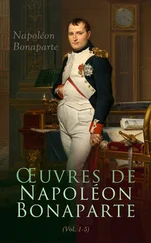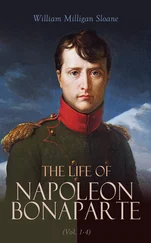Louis Bourrienne - Memoirs of Napoleon Bonaparte — Volume 06
Здесь есть возможность читать онлайн «Louis Bourrienne - Memoirs of Napoleon Bonaparte — Volume 06» — ознакомительный отрывок электронной книги совершенно бесплатно, а после прочтения отрывка купить полную версию. В некоторых случаях можно слушать аудио, скачать через торрент в формате fb2 и присутствует краткое содержание. Жанр: Биографии и Мемуары, История, foreign_edu, foreign_antique, foreign_prose, на английском языке. Описание произведения, (предисловие) а так же отзывы посетителей доступны на портале библиотеки ЛибКат.
- Название:Memoirs of Napoleon Bonaparte — Volume 06
- Автор:
- Жанр:
- Год:неизвестен
- ISBN:нет данных
- Рейтинг книги:3 / 5. Голосов: 1
-
Избранное:Добавить в избранное
- Отзывы:
-
Ваша оценка:
- 60
- 1
- 2
- 3
- 4
- 5
Memoirs of Napoleon Bonaparte — Volume 06: краткое содержание, описание и аннотация
Предлагаем к чтению аннотацию, описание, краткое содержание или предисловие (зависит от того, что написал сам автор книги «Memoirs of Napoleon Bonaparte — Volume 06»). Если вы не нашли необходимую информацию о книге — напишите в комментариях, мы постараемся отыскать её.
Memoirs of Napoleon Bonaparte — Volume 06 — читать онлайн ознакомительный отрывок
Ниже представлен текст книги, разбитый по страницам. Система сохранения места последней прочитанной страницы, позволяет с удобством читать онлайн бесплатно книгу «Memoirs of Napoleon Bonaparte — Volume 06», без необходимости каждый раз заново искать на чём Вы остановились. Поставьте закладку, и сможете в любой момент перейти на страницу, на которой закончили чтение.
Интервал:
Закладка:
Louis Antoine Fauvelet de Bourrienne
Memoirs of Napoleon Bonaparte — Volume 06
CHAPTER IX
1802.
Proverbial falsehood of bulletins—M. Doublet—Creation of the Legion of Honour—Opposition to it in the Council and other authorities of the State—The partisans of an hereditary system— The question of the Consulship for life.
The historian of these times ought to put no faith in the bulletins, despatches, notes, and proclamations which have emanated from Bonaparte, or passed through his hands. For my part, I believe that the proverb, "As great a liar as a bulletin," has as much truth in it as the axiom, two and two make four.
The bulletins always announced what Bonaparte wished to be believed true; but to form a proper judgment on any fact, counter-bulletins must be sought for and consulted. It is well known, too, that Bonaparte attached great importance to the place whence he dated his bulletins; thus, he dated his decrees respecting the theatres and Hamburg beef at Moscow.
The official documents were almost always incorrect. There was falsity in the exaggerated descriptions of his victories, and falsity again in the suppression or palliation of his reverses and losses. A writer, if he took his materials from the bulletins and the official correspondence of the time, would compose a romance rather than a true history. Of this many proofs have been given in the present work.
Another thing which always appeared to me very remarkable was, that Bonaparte, notwithstanding his incontestable superiority, studied to depreciate the reputations of his military commanders, and to throw on their shoulders faults which he had committed himself. It is notorious that complaints and remonstrances, as energetic as they were well founded, were frequently addressed to General Bonaparte on the subject of his unjust and partial bulletins, which often attributed the success of a day to some one who had very little to do with it, and made no mention of the officer who actually had the command. The complaints made by the officers and soldiers stationed at Damietta compelled General Lanusse, the commander, to remonstrate against the alteration of a bulletin, by which an engagement with a body of Arabs was represented as an insignificant affair, and the loss trifling, though the General had stated the action to be one of importance, and the loss considerable. The misstatement, in consequence of his spirited and energetic remonstrances, was corrected.
Bonaparte took Malta, as is well known, in forty-eight hours. The empire of the Mediterranean, secured to the English by the battle of Aboukir, and their numerous cruising vessels, gave them the means of starving the garrison, and of thus forcing General Vaubois, the commandant of Malta, who was cut off from all communication with France, to capitulate. Accordingly on the 4th of September 1800 he yielded up the Gibraltar of the Mediterranean, after a noble defence of two years. These facts require to be stated in order the better to understand what follows.
On 22d February 1802 a person of the name of Doublet, who was the commissary of the French Government at Malta when we possessed that island, called upon me at the Tuileries. He complained bitterly that the letter which he had written from Malta to the First Consul on the 2d Ventose, year VIII. (9th February 1800), had been altered in the 'Moniteur'. "I congratulated him," said M. Doublet, "on the 18th Brumaire, and informed him of the state of Malta, which was very alarming. Quite the contrary was printed in the 'Moniteur', and that is what I complain of. It placed me in a very disagreeable situation at Malta, where I was accused of having concealed the real situation of the island, in which I was discharging a public function that gave weight to my words." I observed to him that as I was not the editor of the 'Moniteur' it was of no use to apply to me; but I told him to give me a copy of the letter, and I would mention the subject to the First Consul, and communicate the answer to him. Doublet searched his pocket for the letter, but could not find it. He said he would send a copy, and begged me to discover how the error originated. On the same day he sent me the copy of the letter, in which, after congratulating Bonaparte on his return, the following passage occurs:—"Hasten to save Malta with men and provisions: no time is to be lost." For this passage these words were substituted in the 'Moniteur': "His name inspires the brave defenders of Malta with fresh courage; we have men and provisions."
Ignorant of the motives of so strange a perversion, I showed this letter to the First Consul. He shrugged up his shoulders and said, laughing, "Take no notice of him, he is a fool; give yourself no further trouble about it."
It was clear there was nothing more to be done. It was, however, in despite of me that M. Doublet was played this ill turn. I represented to the First Consul the inconveniences which M. Doublet might experience from this affair. But I very rarely saw letters or reports published as they were received. I can easily understand how particular motives might be alleged in order to justify such falsifications; for, when the path of candour and good faith is departed from, any pretest is put forward to excuse bad conduct. What sort of a history would he write who should consult only the pages of the 'Moniteur'?
After the vote for adding a second ten years to the duration of Bonaparte's Consulship he created, on the 19th of May, the order of the Legion of Honour. This institution was soon followed by that of the new nobility. Thus, in a short space of time, the Concordat to tranquillize consciences and re-establish harmony in the Church; the decree to recall the emigrants; the continuance of the Consular power for ten years, by way of preparation for the Consulship for life, and the possession of the Empire; and the creation, in a country which had abolished all distinctions, of an order which was to engender prodigies, followed closely on the heels of each other. The Bourbons, in reviving the abolished orders, were wise enough to preserve along with them the Legion of Honour.
It has already been seen how, in certain circumstances, the First Consul always escaped from the consequences of his own precipitation, and got rid of his blunders by throwing the blame on others—as, for example, in the affair of the parallel between Caesar, Cromwell, and Bonaparte. He was indeed so precipitate that one might say, had he been a gardener, he would have wished to see the fruits ripen before the blossoms had fallen off. This inconsiderate haste nearly proved fatal to the creation of the Legion of Honour, a project which ripened in his mind as soon as he beheld the orders glittering at the button-holes of the Foreign Ministers. He would frequently exclaim, "This is well! These are the things for the people!"
I was, I must confess, a decided partisan of the foundation in France of a new chivalric order, because I think, in every well-conducted State, the chief of the Government ought to do all in his power to stimulate the honour of the citizens, and to render them more sensible to honorary distinctions than to pecuniary advantages. I tried, however, at the same time to warn the First Consul of his precipitancy. He heard me not; but I must with equal frankness confess that on this occasion I was soon freed from all apprehension with respect to the consequences of the difficulties he had to encounter in the Council and in the other constituted orders of the State.
On the 4th of May 1801 lie brought forward, for the first time officially, in the Council of State the question of the establishment of the Legion of Honour, which on the 19th May 1802 was proclaimed a law of the State. The opposition to this measure was very great, and all the power of the First Consul, the force of his arguments, and the immense influence of his position, could procure him no more than 14 votes out of 24. The same feeling was displayed at the Tribunate; where the measure only passed by a vote of 56 to 38. The balance was about the same in the Legislative Body, where the votes were 166 to 110. It follows, then, that out of the 394 voters in those three separate bodies a majority only of 78 was obtained. Surprised at so feeble a majority, the First Consul said in the evening, "Ah! I see very clearly the prejudices are still too strong. You were right; I should have waited. It was not a thing of such urgency. But then, it must be owned, the speakers for the measure defended it badly. The strong minority has not judged me fairly."— "Be calm," rejoined I: "without doubt it would have been better to wait; but the thing is done, and you will soon find that the taste for these distinctions is not near gone by. It is a taste which belongs to the nature of man. You may expect some extraordinary circumstances from this creation—you will soon see them."
Читать дальшеИнтервал:
Закладка:
Похожие книги на «Memoirs of Napoleon Bonaparte — Volume 06»
Представляем Вашему вниманию похожие книги на «Memoirs of Napoleon Bonaparte — Volume 06» списком для выбора. Мы отобрали схожую по названию и смыслу литературу в надежде предоставить читателям больше вариантов отыскать новые, интересные, ещё непрочитанные произведения.
Обсуждение, отзывы о книге «Memoirs of Napoleon Bonaparte — Volume 06» и просто собственные мнения читателей. Оставьте ваши комментарии, напишите, что Вы думаете о произведении, его смысле или главных героях. Укажите что конкретно понравилось, а что нет, и почему Вы так считаете.












